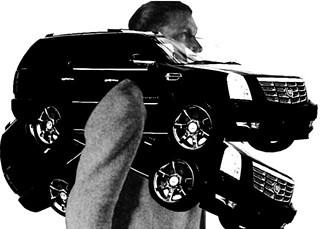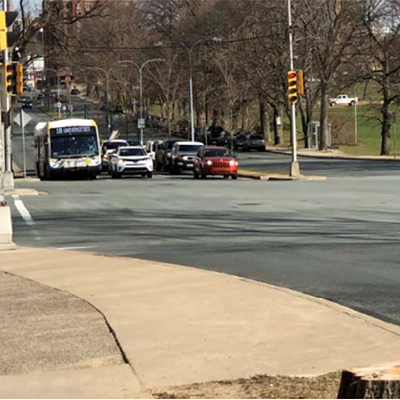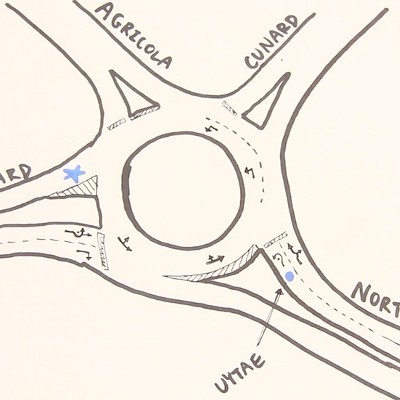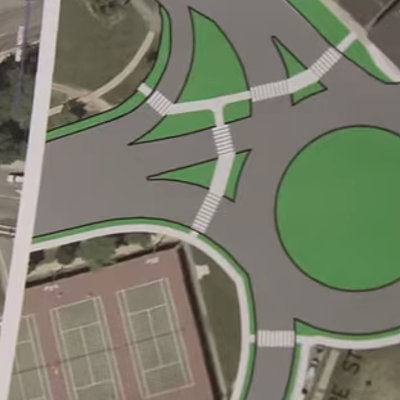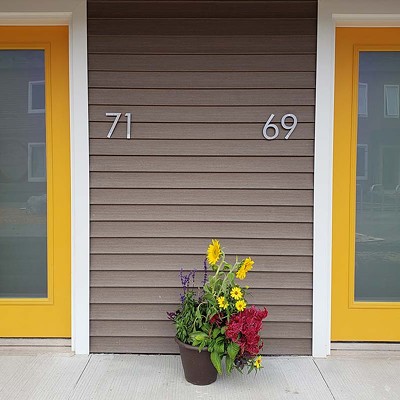Cars are the number-one killer of people under 35 in this part of the world. A couple of thousand pounds of high-speed steel and glass may have seemed like a good idea at one time, but cars have made simple acts like walking risky business.
Urban sprawl increases that risk. Abundant research shows a strong link between sprawl and traffic fatalities. Large car-biased cities like Orlando and Phoenix are most dangerous for pedestrians and drivers. Planners and safety experts say a 10-percent reduction in sprawl reduces traffic deaths by 15 percent.
But the reality of sprawl makes life without cars unthinkable---how would we get to Walmart?
Vauban, a suburban township of Freiburg Germany, doesn't care about that---Walmart was all but exiled from Germany in 2006. The town of 5,000 was designed and built by ex-hippies in the mid-'90s to be sustainable, car-free.
The only motor vehicles in Vauban---a former Nazi barracks---are delivery trucks. Their stay is limited to a few minutes. People traverse on foot and bicycle. Vauban's become a tourist attraction for the eco-curious, who arrive by the busload to watch children make chalk art in the middle of the road.
If a former base for one of humanity's worst atrocities, and a suburb, can be transformed into a model of sustainable living, maybe there is hope for Halifax Regional Municipality, even though it's huge, sparsely populated, with a crappy bus system.
According to Genuine Progress Index Atlantic, the average HRMer drives 8,000 kilometres a year, emitting two tonnes of greenhouse gasses. We spend four grand each in property and income taxes for building and repairing driving infrastructure and on accidents. We travel just 26 km on public transit each year, while 90 percent of us live within 500 metres of a bus stop. Personally, I don't own a car and yet I manage to drive---thanks to sharing friends'---more than I take the bus.
We have the equivalent of a two-pack-a-day habit. Our patch may be the act of integrating our transportation systems, says Jason Pelley, co-lead of Fusion Halifax's sustainability team. "When you arrive at the airport you should be able to get onto a train into the city," Pelley says, "hop on the bike you've left parked at the train station, cycle home."
Vauban couldn't be car-free if it weren't for the reliable tram that takes people in and out of town. Meanwhile, "Halifax is notorious for its buses not showing up and 300 metres of disconnected bike lanes without benefit," says Pelley.
Nova Scotia's transportation system is hampered by a weak economy, but the Halifax Chamber of Commerce says greater efficiency and cost savings come from integration---bringing management of all the various modes of transportation together into one system. "It's time Halifax considered creating an Integrated Transit Authority," Pelley argues.
If we look beyond the cost of transit we see rewards of increased productivity, fewer traffic jams, reduced costs of healthcare and highway policing. Integration doesn't necessarily mean trams, but we need to see reliable public transit as a basic right for HRM residents---give people in places like Beaver Bank and Lucasville innovative means to get downtown without cars.
"In the Hamptons they have a series of cost-effective, semi-private small buses or vans called jitneys," Pelley says. It reminds me of places like Indonesia and Ghana, which give even the poorest residents reliable, regular transportation in cities and often the countryside too. It isn't exactly car-free, but such systems could drastically reduce the number of cars on HRM roads.
Pelley argues further for a change in mindset to transportation planning based on people, not vehicles. "The generation that built our infrastructure for cars still has a lot of power," Pelley says. "We need real leadership listening to knowledgeable constituents."
One such constituent, Charmaine Dymond, grew up in Sackville and spent a few too many hours on the "dreaded 80" bus. Her family of three has been car-free for about two years. "We live on the peninsula now," she says, "so that makes it easier."
She has a wish-list that would make car-free life in HRM better. "I'd love to get rid of all those parking lots on the waterfront and have a beautiful water park, lots of green space, a decent kiddie pool," she says.
She is a fan of the shuttle bus approach---direct routes to high-traffic areas like Bayers Lake and Dartmouth Crossing. "Or better yet," she adds, "get rid of them. Encourage street shopping and stores in neighbourhoods where people live and can walk, bike or bus easily."
That's the Vauban spirit.

